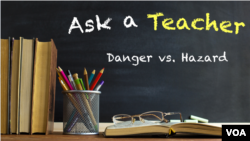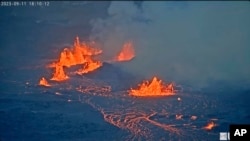Hi there! This week on Ask a Teacher, we will answer a question about the difference between the words "danger” and “hazard.”
Question:
Hello friends,
I'm Roberto, and I live in São Paulo, Brazil. I have a question. What's the difference between "danger" and "hazard"? Thank you.
Answer
Thanks for your question, Roberto. Both “danger” and “hazard” are nouns that can mean a dangerous or life-threatening situation. But each can refer to a more specific possibility of harm that separate meanings.
Let’s start with “danger.”
Danger
“Danger” has a few meanings. It can be used as a substitute for risk, for example.
Ellie’s job is in danger since she protested the pay changes at her workplace.
The danger of wrecking a car is greater when it begins to rain because the water spreads the oil on the roads before it washes it away.
A “danger” is something or someone that can hurt you.
The escaped prisoner was a danger to the area surrounding the prison.
Dangers usually involve immediacy.
This is different from “hazard,” in which the exposure might be extremely low, but there is a higher chance of great harm or death.
Let’s look more closely at “hazard” now.
Hazard
A “hazard” is a source of danger or harm to a person or environment.
Deep frying turkeys on Thanksgiving is a fire hazard.
Radiation exposure is a hazard to our health.
“Hazard” is a known threat. Yet, there is an unpredictable element to a “hazard.”
Take for example a volcano. Volcanoes are a hazard to not only the people that live near them, but they are also a hazard to the environment. Volcanoes have a great possiblity of harm and the possibility of eruptions is difficult to predict.
As a plural noun, “hazards” are special lights on cars that flash on and off to warn other drivers. They are used when a vehicle is either not working properly or if the road or weather conditions are hazardous.
Drivers often turn on their hazards when there is thick fog to make it easier for other drivers to see them.
Please let us know if these explanations and examples have helped you, Roberto.
Do you have a question about American English? Send us an email at learningenglish@voanews.com.
And that’s Ask a Teacher.
I’m Faith Pirlo.
Faith Pirlo wrote this lesson for VOA Learning English.
_______________________________________________
Words in This Story
exposure – n. the fact or condition of being affected by something or experiencing something
flash – n. a sudden burst of light








Forum